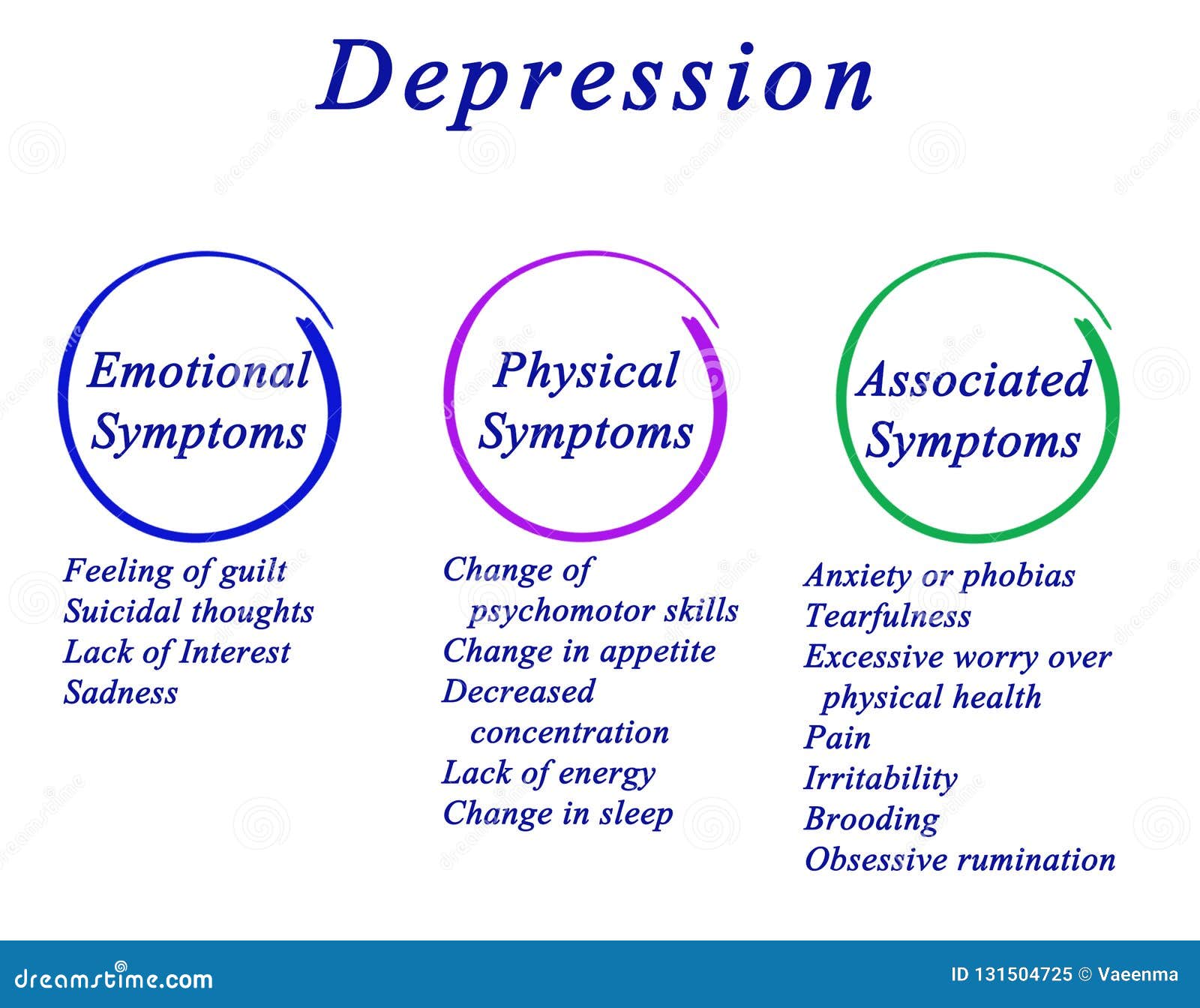Depression which is defined as a low mood along with fatigue inability to enjoy normally enjoyable activities and physical symptoms such as pain and loss of appetite affects around 216 million people in the world. Living with an untreated anxiety or depressive disorder can impact more than your daily life it can also affect your physical health either by making existing health problems worse or causing serious problems to develop.
 Symptoms Of Depression Stock Illustration Illustration Of Concentration 131504725
Symptoms Of Depression Stock Illustration Illustration Of Concentration 131504725
Although increasing physical activity has demonstrated a beneficial role in fighting anxiety and depression changing an inactive lifestyle and beginning an exercise regimen is achallenging endeavor for many individuals.

Physical effects of anxiety and depression. Effects on physical health. Effects of physical exercise on anxiety depression and sensitivity to stress. Anxiety and depression both disturb the sleeping pattern.
Pain stomach upset fatigue and restlessness are just a few potential physical effects of depression. The links between depression anxiety and exercise arent entirely clear but working out and other forms of physical activity can definitely ease symptoms of depression or anxiety and make you feel better. Acutely emotional effects of exercise remain confusing both positive and negative effects.
In addition to the mental and emotional repercussions these issues can affect your physical health too. Close to half of adults who are diagnosed with an anxiety disorder also have some type of depressive disorder. Physical effects of depression.
Depression can also affect a persons physical health. Long term effects of anxiety and depression. Therefore the authors of this study attempted to document the effectiveness of different training intensities to reduce symptoms of depression and anxiety in pre-teens.
Feelings of butterflies in the stomach. Difficulties with school work or. Quality of sleep is affected which can lead to other problems like fatigue irritation etc.
Having anxiety can lead to long-term negative effects. The overlap of anxiety depression and pain is particularly evident in chronic and sometimes disabling pain syndromes such as fibromyalgia irritable bowel syndrome low. Anxiety and depression often go hand-in-hand.
19 Ways Anxiety and Depression Wreak Havoc On Your Body Mental illness can affect everything from your immune system to your heart health. The intensity of the most appropriate exercise to use in depressed youth is unclear due to differences in methodology and the lack of evidence documenting the effect of physical activity in children. Exercise may also help keep depression and.
In some cases both anxiety and depression can be detected via physical symptoms. Insomnia is very common. The effects of depression may extend beyond a persons emotions and mental health.
As a result of this response we can experience a range of physical symptoms that we may not initially realise are linked to our anxiety. According to previous studies various strategies have been reported as possible approaches to increase physical activity. Physical symptoms of generalized anxiety disorder include fatigue muscle tension and trouble with.
People can have these physical symptoms for a variety of reasons but they may not realize depression can be among the potential causes. People with anxiety may experience. Physical symptoms of anxiety include.
Anxiety disorders can cause rapid heart rate palpitations and chest pain. However its important not to overlook the physical repercussions of anxiety and depression and the toll they can take on our bodies Physical symptoms often associated with anxiety can include chest pain increased heart rate increased blood pressure breathing problems digestive problems headaches and muscle aches decreased sex drive extreme fatigue sweating shaking. Having both anxiety and depression was linked to an increase in vision problems stomach problems and asthma among other issues.
Until recently claims for the psychological benefits of physical exercise have tended to precede supportive evidence. Gastrointestinal issues fatigu e sleep problems and appetite changes can also signal depression. Depression strikes more than 16 million Americans at least once in their lives while almost 1 in 5 American adults have experienced an anxiety disorder in the last year alone.
Depression and anxiety are growing problems in the modern world. Depression sometimes presents as unexplained aches and pains in joints limbs or the back.
